Tuesday, April 9, 2024. Annette’s News Roundup.
I think the Roundup makes people feel not so alone.
To read an article excerpted in this Roundup, click on its blue title. Each “blue” article is hyperlinked so you can read the whole article.
Please feel free to share.
Invite at least one other person to subscribe today! https://buttondown.email/AnnettesNewsRoundup
____________________________________________
Joe is always busy.
From the air, I saw a bridge that’s been ripped apart.
— President Biden (@POTUS) April 6, 2024
But here on the ground, I see a community that’s come together.
I want to thank all the first responders, port workers, and state and local officials who sprang into action before dawn and who’ve been here ever since. pic.twitter.com/0OygdfojCq
Touch to watch our President.
WATCH LIVE: Biden speaks in Baltimore after deadly bridge collapse https://t.co/3ruzjyfwsc pic.twitter.com/Ls3Ppab9gj
— The Hill (@thehill) April 5, 2024
Direct File is a free, secure, and simple way for taxpayers in 12 states to file directly with the IRS – and it was made possible by President Biden’s Inflation Reduction Act.
— The White House (@WhiteHouse) April 6, 2024
To check your eligibility, visit https://t.co/Xqm8EBrEOH. pic.twitter.com/XjtLQQA8Le
4 million more student loan borrowers will benefit.
I said I wouldn't back down from using every tool at our disposal to get student loan borrowers the relief they need.
— President Biden (@POTUS) April 8, 2024
That's why today we're announcing new plans that, if implemented, would cancel student debt for millions more. pic.twitter.com/rNiCxzzlU3
White House, officials condemn Ugandan court’s Anti-Homosexuality Act ruling https://t.co/NU1jN9QkrE
— Washington Blade (@WashBlade) April 7, 2024
From @DanRather.
This!!! 👇👇👇#RFKJr pic.twitter.com/CM8CEWJ5O1
— Jon Cooper (@joncoopertweets) April 3, 2024
One more thing.
Here’s what Donald Trump says when he thinks you’re not watching: He says he’s going to cut taxes for his rich friends, all while cutting Social Security for everyone else. @BernieSanders and I are mad as hell about it, and together, we’re going to stop him. pic.twitter.com/QYcBILQkzY
— Joe Biden (@JoeBiden) April 5, 2024
____________________________________________
Updates on Trump trials.
Judge Aileen Cannon, The Presidential Records Act and What Jack Smith Should Do.
Judge Cannon Rules
By Joyce Vance
Judge Cannon rules are not the rules lawyers are used to seeing applied in a courtroom. Hers is a court increasingly reminiscent of “Alice’s Adventures in Wonderland,” where important matters are upside down. The Queen of Hearts told Alice during the trial of the Knave of Hearts, “sentence first, verdict afterwards.” Judge Cannon ordered Jack Smith to provide her with jury instructions on the application of the Presidential Records Act (PRA) long before the case could even conceivably be ready to go to trial—jury instructions are typically filed shortly before trial begins. Judge Cannon hasn’t even ruled definitively on the role the Presidential Records Act will play in permitting Trump to mount a defense (which, of course, it shouldn’t do at all). Increasingly, the common theme seems to be that she finds disingenuous paths around rulings that would permit the Special Counsel to appeal her errors.

On Thursday, the Judge responded to the Special Counsel’s response to her order for proposed jury instructions, predicated on an alternate reality where the Presidential Records Act plays a role in whether Trump violated the Espionage Act. Jack Smith definitively put to rest any notion that could be the case in his briefs and again in the response to the Judge’s order we reviewed earlier this week.
In her brief two-page order, the Judge denied sort of Trump's motion to dismiss the classified documents case based on the PRA. You’ll recall Trump’s argument was that it gave him the ability to designate classified material as personal records, which somehow meant he couldn’t be prosecuted for keeping Top Secret material in his bathroom and ballroom at Mar-a-Lago. Judge Cannon DENIED Trump’s motion, but with this odd language about the four corners of the indictment. She does point out correctly, that the indictment doesn’t rely on the PRA to charge Trump (because, and I’m trying to avoid shouting here, the PRA has no relevance to the Espionage Act charges). But it goes downhill from there.
Judge Cannon seems to be walking back then denial a bit, leaving some ambiguity about the finality of her ruling on the PRA’s applicability to the case. She at least declines to finalize the jury instructions, which would make sense in a normal case where a judge would be ruling on pre-trial motions and not thinking about formal jury instructions at this stage. What doesn’t make sense is that the Judge asked for jury instructions at all this early on. They are usually filed a few days before trial, tweaked during the process, and finalized in a charge conference shortly before the Judge reads them to the jury. So it’s bizarre that she first demanded them, seemingly as a way of avoiding ruling on Trump’s motion to dismiss the case under the PRA, and then got angry with the government before indignantly refusing to finalize them herself.
In his response earlier this week, Smith asked her to rule on the PRA motion. He pointed out that since Trump’s argument about the PRA wasn’t valid, there would be no need to instruct the jury about it. But Judge Cannon seemed to view the jury instructions side show as a way of winking and nodding at Trump about the future of his defense once the case went to trial. So it’s off base for her to call Smith’s request to clarify the ground rules "unprecedented and unjust." It’s possible to imagine that language come back to haunt her, when the Eleventh Circuit ultimately looks at this situation—because that moment is inevitably coming—and decides whose position here has been unprecedented and unjust.
It’s no wonder, given the Judge’s strange handling of this matter, that legal analysts are still searching for ideas about the best strategy the Special Counsel’s office can use to deal with the situation, without coming up with a definitive answer. When it comes to the PRA issue, the government needs (and is entitled to) a ruling before trial begins—and to appeal it if it goes against them. There is an acceptable range of variation in how courts handle cases, but this is the type of issue judges typically recognize and rule on so the appeal can proceed, just like Judge Chutkan did in Washington, D.C., with the immunity issue. Instead, Judge Cannon seems determined to try and sandbag the prosecution. Smith’s position makes sense: the prosecution can’t appeal after an acquittal, so they need to be able to appeal a clearly erroneous decision by the Judge on the law before an acquittal happens. For the Special Counsel’s office, being in Judge Cannon’s courtroom has become akin to having a seat at the Mad Hatter’s tea table.
Judge Cannon has repeatedly given herself wiggle room by putting off a ruling until trial gets underway—she did that previously with Trump’s motion to dismiss on vagueness grounds. If she rules in Trump’s favor once the trial is underway, that’s it. The government has no right of appeal because of double jeopardy. Prosecutors need to solve that problem before trial starts.
So, what’s the Special Counsel to do? A number of different options are being floated. None of them are perfect, but a strategy will have to be crafted.
Mandamus: Lots of talk about filing a writ of mandamus, but that was before Judge Cannon entered her order. It’ probably off the table for now. Had Judge Cannon refused to rule, the Special Counsel could have tried to use the writ to force her to do so. Had she ruled against him on the PRA motion he could have taken a direct appeal. But now, she has entered an order, and because mandamus, a rarely used writ, is limited to situations where a judge won’t do something that they clearly must do, or is doing something they clearly can’t do, it probably doesn’t work here. Mandamus is usually about the performance of purely ministerial duties, something the court doesn’t have discretion about in a situation where the party seeking mandamus doesn’t have any other remedy. In the language the Supreme Court has used since 1840, “The power of a district court to compel official action by mandatory order is limited to the enforcement of nondiscretionary, plainly defined, and purely ministerial duties.” And in 1919, "But where there is discretion … even though its conclusion be disputable, it is impregnable to mandamus." The very limited nature of the writ is well-established and Judge Cannon’s order seems to put her beyond it, for now.
Motion in limine: Some folks have suggested the government should file a pre-trial motion asking the Judge to keep Trump from mentioning the PRA during trial. This is a good idea, and the government should definitely do it. The problem is that standing on its own, it may not do the trick. For one thing, the Judge could put off ruling, almost indefinitely. She’s shown a knack for doing that. This is probably part of, but not a complete strategy.
Recusal motion: This continues to have a lot of appeal for the government and I continue to think it may be their best shot. Recusal works best if it comes along with the government appealing a specific action the Judge has taken, like a ruling against the government on the PRA motion. But even without a ruling, given her history, her delays, and her odd orders and partial rulings, this one is better than mandamus at this point.
A better option? The government might file a motion asking the Judge to clarify her ruling on the PRA. This would be akin to the motion in limine, but it would ask her to clarify/reconsider the order that on the one hand seems to deny Trump’s motion to dismiss under the PRA while simultaneously leaving the possibility of a jury instruction on it open. A failure to respond or clarify the ruling could set up a recusal motion. Perhaps, cornered, she might give the Special Counsel the ruling they seek on the PRA and put the issue to rest.
One way or another, on one issue or another, this case is very likely headed to the Eleventh Circuit before trial, even if that means more delay. If Judge Cannon continues as she has, the outcome seems to be all but a foregone conclusion. And it’s difficult to believe that, at this point, any panel of Eleventh Circuit judges wouldn’t believe the Judge needs to step aside.
It’s worth noting that because Judge Cannon has delayed rulings, there are issues beyond the PRA that must be decided before trial and could result in an appeal. There are motions regarding presidential immunity motion and selective/vindictive prosecution still pending. There are classified evidence issues yet to be decided under the Classified Information Procedures Act (CIPA). There might be motions in limine that result in a decision by the Judge to exclude evidence the government obtained during the search of Mar-a-Lago or that Trump claims is protected by attorney-client privilege that could lead to pre-trial appeals. (From Joyce Vance, Civil Discourse, April 7).
Trump’s Lawyers Told the Court That No One Would Give Him a Bond. Then He Got a Lifeline, but They Didn’t Tell the Judges.
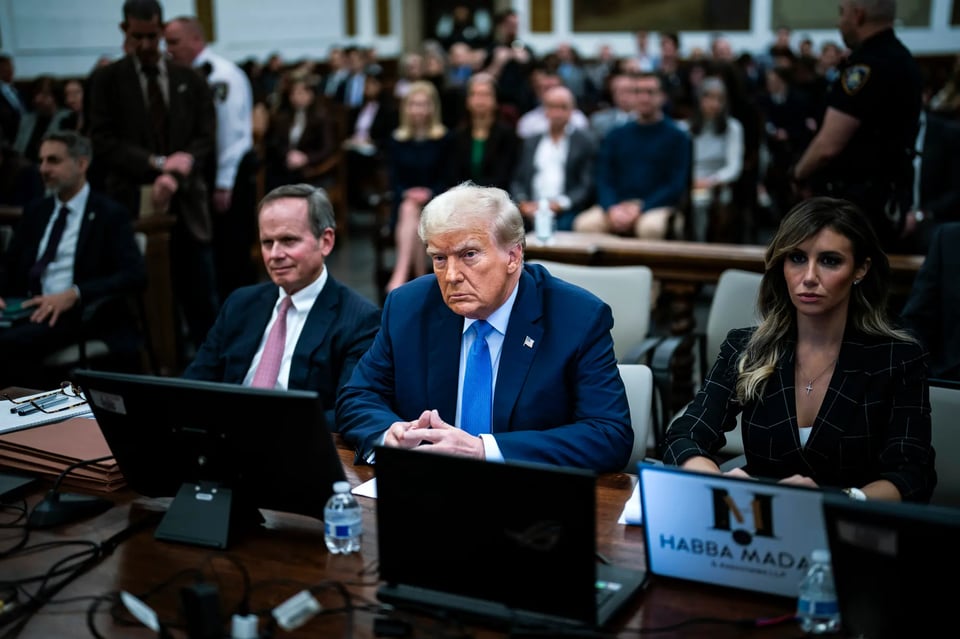
An appeals court reduced Trump’s bond by more than 60% after his attorneys claimed it was a “practical impossibility” to pay the full amount. Their failure to disclose a proposal from a billionaire financier may have violated ethics rules.
Former President Donald Trump scored a victory last week when a New York court slashed the amount he had to put up while appealing his civil fraud case to $175 million.
His lawyers had told the appellate court it was a “practical impossibility” to get a bond for the full amount of the lower court’s judgment, $464 million. All of the 30 or so firms Trump had approached balked, either refusing to take the risk or not wanting to accept real estate as collateral, they said. That made raising the full amount “an impossible bond requirement.”
But before the judges ruled, the impossible became possible: A billionaire lender approached Trump about providing a bond for the full amount.
The lawyers never filed paperwork alerting the appeals court. That failure may have violated ethics rules, legal experts say.
In an interview with ProPublica, billionaire California financier Don Hankey said he reached out to Trump’s camp several days before the bond was lowered, expressing willingness to offer the full amount and to use real estate as collateral.
“I saw that they were rejected by everyone and I said, ‘Gee, that doesn’t seem like a difficult bond to post,’” Hankey said.
As negotiations between Hankey and Trump’s representatives were underway, the appellate court ruled in Trump’s favor, lowering the bond to $175 million. The court did not give an explanation for its ruling.
Hankey ended up giving Trump a bond for the lowered amount.
It’s unclear if Trump lawyer Alina Habba or the rest of his legal team were made aware that Hankey reached out about a deal for the full amount. Trump’s legal team did not respond to requests for comment.
After ProPublica reached out to Trump’s representatives, Hankey called back and revised his account. He said he had heard “indirectly” about ProPublica’s subsequent inquiries to Trump’s lawyers. In the second conversation, he said that accepting the real estate as collateral would have been complicated and that he wouldn’t have been able to “commit” to providing a bond in the full amount “until I evaluate the assets.”
Legal ethics experts said it would be troubling if Trump’s lawyers knew about Hankey’s approach and failed to notify the court.
New York state’s rules of professional conduct for lawyers forbid attorneys from knowingly making false statements to a court. At the time Trump’s lawyers told the court that meeting the bond would be impossible, Hankey said he had not yet reached out to the Trump team.
But the rules of conduct also dictate that lawyers must “correct a false statement of material fact or law previously made” to the court.
“If that deal was on the table for the taking, the representation from the earlier time would be untrue, and the lawyer would have an obligation to correct,” said Stephen Gillers, a legal ethics professor at New York University Law School.
In the rules of conduct for lawyers, the failure to update an important piece of evidence would fall under what’s referred to as the “duty of candor to a tribunal,” said Ellen Yaroshefsky, a professor of legal ethics at Hofstra Law.
“Any judge is going to be furious that this wasn’t corrected,” she said.
Scott Cummings, a legal ethics professor at UCLA’s law school, agreed that there was a potential ethical failure but said Trump’s lawyers could argue that they were not obligated to alert the court.
“A very narrow reading of this rule would be there is no obligation to report because it wasn’t a false statement at the time,” Cummings said.
The need for the bond arose from a case brought against Trump by the New York attorney general, who accused him of fraudulently inflating his net worth to get favorable loans and other benefits. A judge agreed and ordered Trump and the other defendants to pay $464 million.
Trump had a month to come up with the sum or risked having his properties seized.
When a defendant loses a civil case in New York, the creditor — in this case the attorney general — can immediately go after the defendant’s assets to collect the judgment. The defendant can protect his assets while pursuing an appeal by posting a bond. Typically obtained from an insurance company for a fee, the bond is essentially a promise that the company will guarantee payment of the judgment if the appeal fails.
In his first interview with ProPublica, Hankey said that when he heard Trump was having trouble getting a bond, he reached out to Trump’s camp, several days before the bond was reduced, with an offer to help.
Hankey, who took a break from a game of bocce to speak to ProPublica, is rated by Forbes as one of the 400 wealthiest people in the world with an estimated net worth of more than $7 billion. He made much of his fortune with high-interest car loans to risky borrowers, and he is chairman of a Los Angeles-based network of companies across a range of industries, including real estate, insurance and finance. He has said he supports Trump politically but would have wanted to make the deal no matter his politics.
Hankey told ProPublica that during the talks he came to the conclusion that Trump’s “got the liquidity” and was confused why others would have rejected him, speculating that some may have wanted to avoid political backlash: “If you’re a public company, maybe you don’t want to offend 45% of the population.”
Hankey said he informed Trump’s camp that he was willing to work with them, and “they said they had the collateral.” The two sides went over the assets that had to be pledged, and it was up to Trump “if they wanted to do it.” (In his second call, Hankey said making a deal would have been “difficult.”)
But, he said, the deal for the larger amount was dropped during a large Zoom call between the two sides, when Trump’s camp got a call informing them that the bond was reduced.
“They thanked us for trying to help: ‘Maybe next year, we’ll try to do business again,’” Hankey recalled them saying.
But several days later, Hankey said, they called back, hoping to make a deal for the reduced bond, and Hankey agreed.
The bond saga is not over. In a brief court filing on Thursday, the New York attorney general asked Trump or Hankey’s company to show that the company has the financial means to fulfill the $175 million bond. (ProPublica).
https://www.newsweek.com/donald-trump-bond-rejected-due-low-fee-insurer-suggests-1887549____________________________________________
Abortion remains the issue most likely to affect the 2024 Presidential Election.
Yesterday, a cynical Trump who has been bragging that he killed Roe v. Wade, said he thinks States should define abortion restrictions.
“Trump ended his message by sharing the key point that seemed to be the basis for his position: This is how Republicans will be able to win elections.
"You must follow your heart on this issue but remember, you must also win elections to restore our culture and, in fact, to save our country, which is currently and very sadly, a nation in decline ... Always go by your heart. But we must win. We have to win, we are a failing nation," he said.” (ABC)
BTW, even now, Trump has also not said he wouldn’t sign a national abortion ban if a Republican controlled House and Senate sent him a national ban.
Biden rips into Trump over abortion statement
The president’s campaign launched a barrage of attacks – putting every draconian state law at the ex-president’s feet.
Joe Biden’s advisers didn’t know if Donald Trump would ever offer up a formal policy on abortion.
But when the moment finally arrived, they were ready.
Trump’s announcement on Monday that he supports leaving the debate about abortion restrictions to the states sparked a torrent of political attacks, with Biden and his allies accusing their GOP rival of ushering in “cruelty and chaos” in the post-Roe v. Wade era.
The offensive marked a new phase in the Biden team’s bid to make reproductive rights the defining issue of the presidential race. In addition to accusing Trump of paving the way for Roe’s elimination, Democrats on Monday sought to tie him directly to the harshest state abortion laws — and their real-life consequences.
“Trump once said women must be punished for seeking reproductive health care — and he’s gotten his wish,” Biden said in a statement released by his reelection campaign. “Women are being turned away from emergency rooms, forced to go to court to seek permission for the medical attention they need, and left to travel hundreds of miles for health care.”
That was just the opening act. Kaitlyn Kash, who was forced to leave Texas for an abortion after learning her baby had a severe condition and was unlikely to survive birth, joined a separate Biden press call on Monday alongside campaign manager Julie Chávez Rodriguez to highlight the consequences of a patchwork abortion policy.
Shortly thereafter, the Biden campaign put out a new digital ad spotlighting “Amanda,” another Texas woman who suffered a miscarriage and nearly died after doctors refused to perform an abortion. “Trump did this,” the campaign said in a post to Biden’s account.
(Touch 👇 to watch)
This is a painful story that so many families around America now know too well: Amanda was denied the medical care she needed, and it nearly took her life.
— Joe Biden (@JoeBiden) April 8, 2024
More than 1 in 3 women in America now lives under an abortion ban, with more on the way.
Donald Trump did this. pic.twitter.com/2vH8EdzIw8
Across the country, Democrats moved swiftly to capitalize on the opening that Trump provided in a nearly four-and-a-half minute video where the former president took credit for gutting Roe, and argued that individual states should determine when and how harshly to restrict access to abortion.
Prior to the announcement, Trump had come under intense pressure to stake out a clear position after toying for weeks with endorsing a blanket 15-week ban. Trump has privately fretted that the issue is politically toxic for Republicans, especially if they don’t come out in support of exemptions for the life and health of the mother.
“Trump’s statement provided Republicans much needed clarity on this issue,” said Nicole McCleskey, a Republican pollster. “He helped put it to rest by saying, ‘leave it to the states,’ which is what majorities of voters agree with.”
Yet in the immediate aftermath, casting the issue as a state-level decision opened up the former president to criticism from all sides. Anti-abortion activists expressed disappointment with Trump for not coming out for a national policy.
And Biden allies, wary of letting Trump cast his abortion position as a moderate one, emphasized that he had made little attempt to distance himself from the strictest abortion measures around the country.
“Let’s be clear, Trump is not only extremely proud of overturning Roe v. Wade, he supports the nightmarish abortion bans happening in states across the country,” Michigan Democratic Party Chair Lavora Barnes said in a statement.
Democrats also seized on what Trump didn’t say — namely, that he did not explicitly rule out signing a nationwide abortion ban if elected, and refused to condemn states that had banned abortion without exceptions.
In a sign of how critically Biden’s team views the moment, Biden campaign officials kicked off Monday’s press call with an extended admonishment of initial media reports they argued mistakenly indicated that Trump was opposing a national abortion ban.
“His allies do have a plan to ban abortion nationally, without ever going to Congress,” Chávez Rodriguez said, pointing to GOP efforts to restrict medication abortion.
Biden in his own statement said there should “be no illusion. If Donald Trump is elected and the MAGA Republicans in Congress put a national abortion ban on the Resolute Desk, Trump will sign it into law.”
The president singled out Florida’s plan to impose a six-week abortion ban, noting it as an example of a state-level abortion restriction that would make the procedure “illegal before many women know they’re pregnant.”
Trump, who is a Florida resident, has not said whether he supports the state ban and did not address the issue in his video.
Biden, despite having exhibited some discomfort in talking about abortion in the past, has repeatedly vowed to restore Roe v. Wade with legislation if given the chance. He has cast the election as an existential moment for women’s reproductive freedoms. That stance has also offered a sharp contrast with Trump and Republicans, who have struggled for nearly two years to find a tenable consensus for where they stand following the Supreme Court’s Dobbsdecision.
“Having created the chaos of overturning Roe, he’s trying to say, ‘Oh, never mind. Don’t punish me for that. I just want to win,” Biden said. (Associated Press).
Trump hopes that his new position on abortion will earn him a larger swath of voters than his base. But he is learning. Let the backlash and the War between Republicans begin.
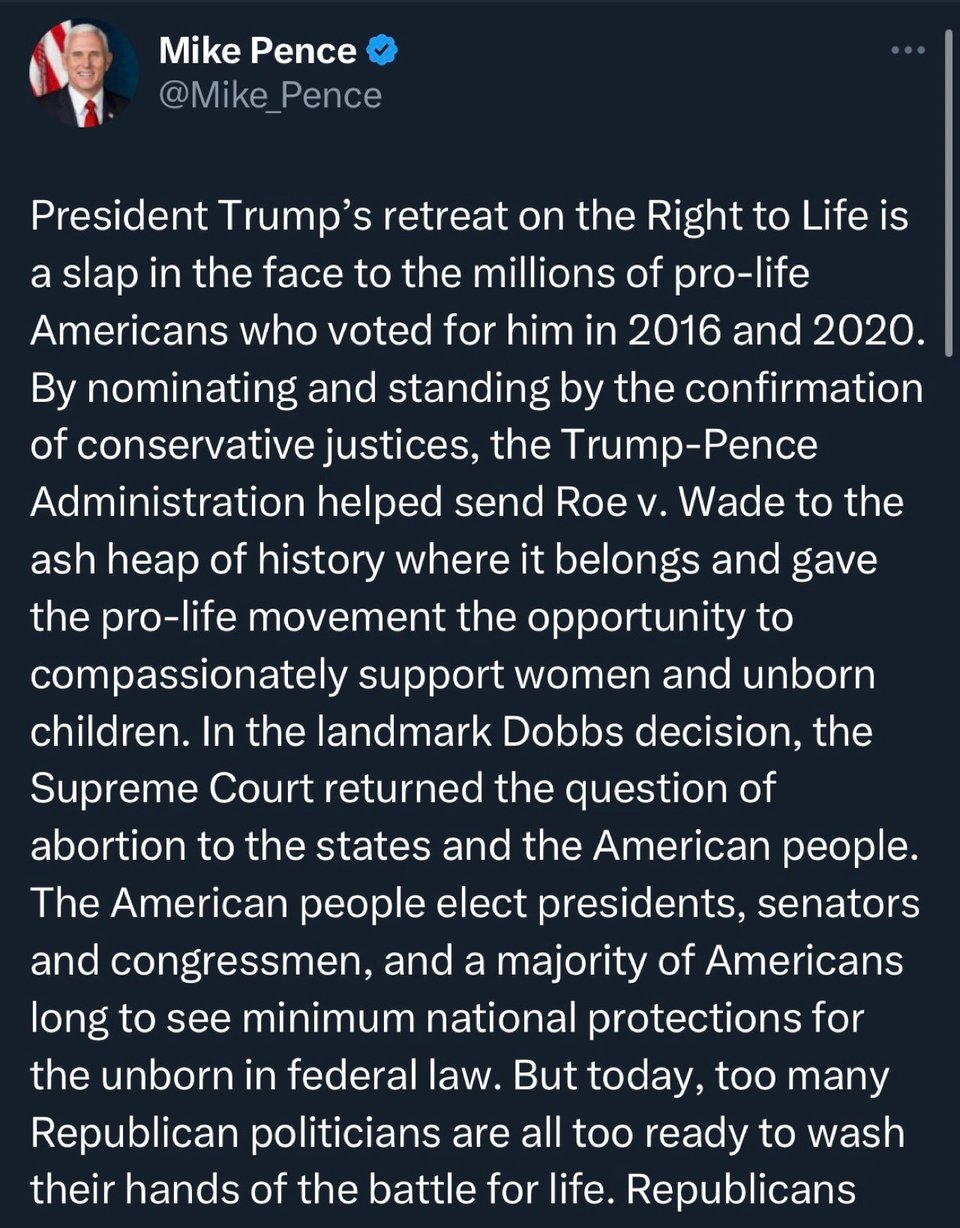
Lindsey Graham says Donald Trump is making 'a mistake' on abortion, vows to push forward with nationwide restrictions (NBC)
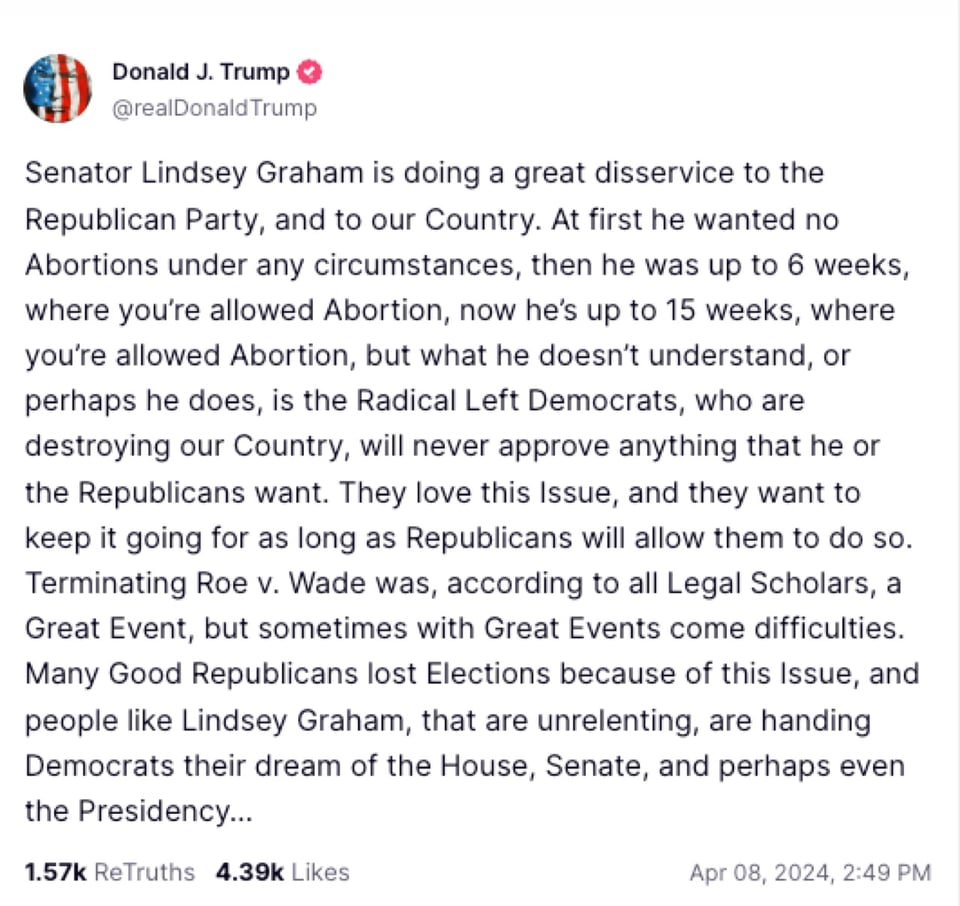
_______________________________________
Appeals Court Denies Another Trump Attempt to Delay Trial.

Donald J. Trump’s criminal trial is scheduled to begin April 15.
Donald J. Trump’s lawyers sought to pause his Manhattan criminal trial as they argued that it should be moved, but a judge rejected their appeal.
One week before Donald J. Trump is set to face a criminal trial in Manhattan, an appeals court judge on Monday rejected his effort to pause the case and move it to a different location.
The judge, Lizbeth Gonzalez, issued the decision Monday afternoon after hearing arguments from Mr. Trump’s lawyers and lawyers from the Manhattan district attorney’s office, which has accused the former president of falsifying records to cover up a sex scandal.
For weeks, Mr. Trump has sought to delay the trial, the first prosecution of a former U.S. president, and possibly the only one of Mr. Trump’s four criminal cases to make it to trial this year.
Mr. Trump’s attempt to move the case out of Manhattan was not the only delay strategy he deployed on Monday. In a separate proceeding, he indicated that he planned to file an unusual type of lawsuit against the judge overseeing the case, Juan M. Merchan.
Two people with knowledge of the matter said that Mr. Trump’s lawyers on Monday had planned to file the action calling on the appeals court to overturn a gag order that Justice Merchan recently imposed on the former president. The order prevents Mr. Trump from attacking witnesses, prosecutors and the judge’s own family.
Court records showed on Monday that Mr. Trump had begun the process of filing the action against Justice Merchan, though the papers were not immediately made public.
An online court docket where Mr. Trump is expected to file the so-called Article 78 action — a special proceeding that comes in the form of a lawsuit and can be used to challenge New York State government agencies and judges — showed that the related paperwork was sealed.
Mr. Trump’s unorthodox move, essentially an appeal in the form of a suit, is unlikely to succeed, particularly so close to trial.
The latest efforts to stop the Manhattan case come as Mr. Trump is separately calling on Justice Merchan to recuse himself from the case.
Mr. Trump and his lawyers argue that the judge has a conflict of interest, citing his daughter’s position at a Democratic consulting firm that worked for President Biden’s campaign in 2020.
Mr. Trump has repeatedly assailed Justice Merchan’s daughter on social media and posted articles with her picture, leading the judge to expand the gag order to bar Mr. Trump from attacking her or other members of his family.
The judge could rule on the recusal request in the coming days. He rejected Mr. Trump’s first recusal request, filed last year, and is likely to do the same this time.
In a response to Mr. Trump’s most recent request, prosecutors for the Manhattan district attorney’s office, which brought the charges against Mr. Trump, wrote that Mr. Trump “predominantly repeats the same arguments that he made in his first recusal motion more than 10 months ago and that this court previously considered and rejected.”
The prosecutors added that the recusal request was based on “a daisy chain of innuendos.”
A spokeswoman for Mr. Bragg declined to comment on the Monday appeal.
Legal actions against judges are unusual, but this is not Mr. Trump’s first attempt to use that tactic to try to delay a trial. Last year, he sued the New York judge presiding over his civil fraud trial — an effort the appeals court ultimately rejected.(New York Times).
____________________________________________
Military leaders speak out against Trump immunity case at the Supreme Court.
Trump immunity bid opposed by 19 top former defense officials in brief filed with Supreme Court | Stars and Stripes.
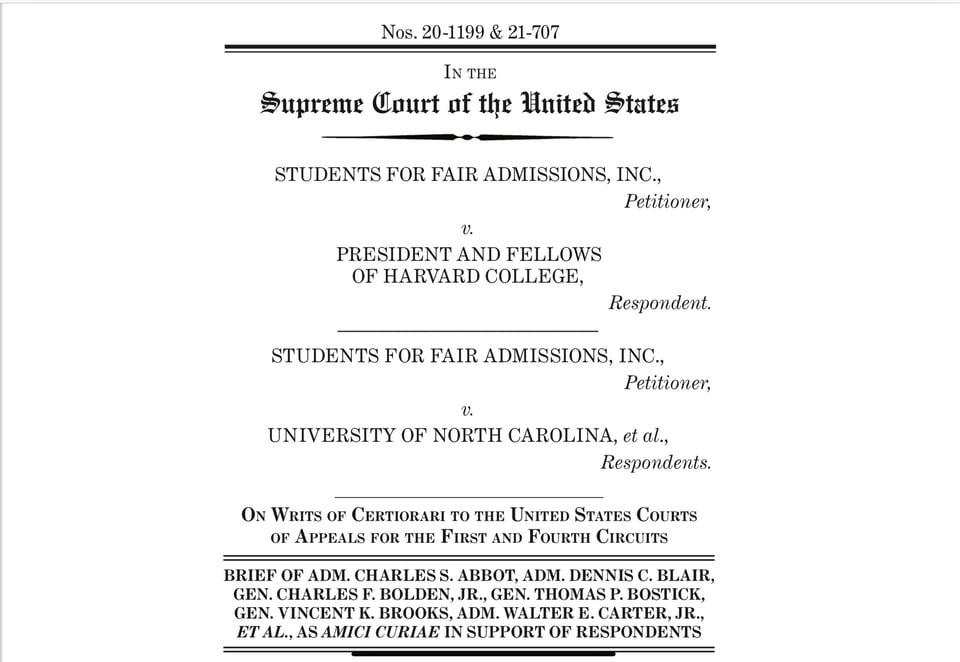
Nineteen retired generals, admirals and former top civilian defense officials have filed a brief with the U.S. Supreme Court opposing former President Donald Trump’s bid for immunity from prosecution.
“We risk jeopardizing America’s standing as a guardian of democracy in the world and further feeding the spread of authoritarianism, thereby threatening the national security of the United States and democracies around the world,” the group wrote.
The 38-page amicus brief includes officials from Democratic and Republican administrations dating back to former President John F. Kennedy, as well as four-star generals from the Army, Air Force and Marines, and Navy and Coast Guard admirals.
The signatories to the brief include Ray Mabus, secretary of the Navy from 2009 to 2017, and retired Air Force Gen. Michael Hayden, who also served as director of the CIA.
The group also includes retired Army Gens. George Casey and Peter Chiarelli, retired Air Force Gens. John Jumper, Craig McKinley and Charles Wald, retired Marine Corps Gens. Carlton Fulford, Charles Krulak and Robert Magnus, retired Navy Adms. Steve Abbot, Samuel Jones Locklear, John Nathman, Bill Owens and Scott Swift, and retired Coast Guard Adm. Thad Allen. Top former civilian defense officials in addition to Mabus are former Army Secretary Louis Caldera, former Air Force Secretary Deborah Lee James, and former Navy Secretary Sean O’Keefe.
The court is scheduled to hear arguments April 25 about the question of Trump’s immunity from facing charges for his role in the alleged criminal conspiracy to block the results of the 2020 election that he lost to President Joe Biden. Trump is not charged in that case.
But he is charged in an election interference case in Georgia that could be impacted by the federal action. Trump is also charged in another federal case accusing him of election interference that has been held up until the case on April 25 is resolved.
The amicus brief — known as a “friend of the court” brief — from the top defense officials argues that without rapid action to negate the claims of immunity, the cases could become moot since they would not be heard prior to the November presidential election.
Trump is the expected Republican nominee against Biden. If elected, Trump could use his presidential authority in a bid to pardon himself from prosecution.
Trump’s lawyers in February argued at the Supreme Court that the possibility of facing prosecution for actions while in office would “incapacitate every future president with de facto blackmail and extortion while in office and condemn him to years of post-office trauma at the hands of political opponents.”
The former military leaders said allowing immunity would undermine confidence in the role of the military at home and abroad, and relations with allies and potential enemies.
“Presidential immunity from criminal prosecution would threaten the military’s role in American society, our nation’s constitutional order, and our national security,” the former defense leaders wrote. “It also would have profoundly negative effects on military service members, who answer to the orders of the president as commander in chief.”
The group argued immunity would place commanders and their troops in a vise between obeying their oath to the Constitution and orders from the president. “The president could, with impunity, direct his national security appointees to, in turn, direct members of the military to execute plainly unlawful orders, placing those in the chain of command in an untenable position and irreparably harming the trust fundamental to civil-military relations,” they wrote.
Here 👇 is the amicus brief.
https://www.supremecourt.gov/DocketPDF/23/23-939/307065/20240408151425926_23-939%20Amicus%20Brief%20of%20Claire%20Finkelstein%20et%20al_.pdf
____________________________________________
The Women’s Sports Report
Women’s NCAA Basketball 🏀 Championship.
By now, you probably know that Dawn Staley and her South Carolina Gamecocks are the 2024 Champions of the NCAA Women’s Division I Basketball Season.
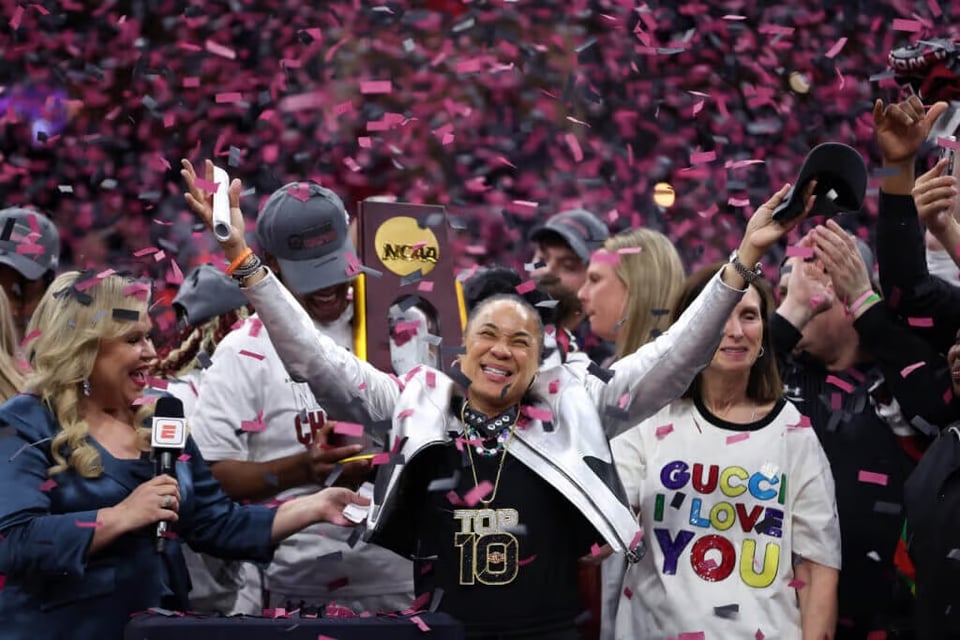
The purest image of Coach Staley and her team’s joy after the Gamecock’s win on Sunday over Iowa.
Then there was this too.👇
Words cannot express my love for my teammates, coaches, fans and our university - Thanks for making my dreams come true. Wearing Iowa across my chest the last four years has been an honor. This place will always be home🖤
— Caitlin Clark (@CaitlinClark22) April 8, 2024
America watched women’s college basketball.
Iowa-UConn Final Four matchup breaks record for most-watched women’s college basketball game.

Another Iowa women’s basketball game, another new record for the sport when it comes to viewership.
Iowa’s 71-69 win over UConn on Friday night in Cleveland set a new record for the most-watched women’s college basketball game in history. The game was viewed by 14.2 million people and peaked at 17 million viewers.
Chad Leistikow of the Des Moines Register was the first to report the news.
This game tops the previous all-time viewership record, which was set on Monday when Iowa’s win over LSU averaged 12.3 million viewers and peaked at 16 million viewers. (The Athletic).
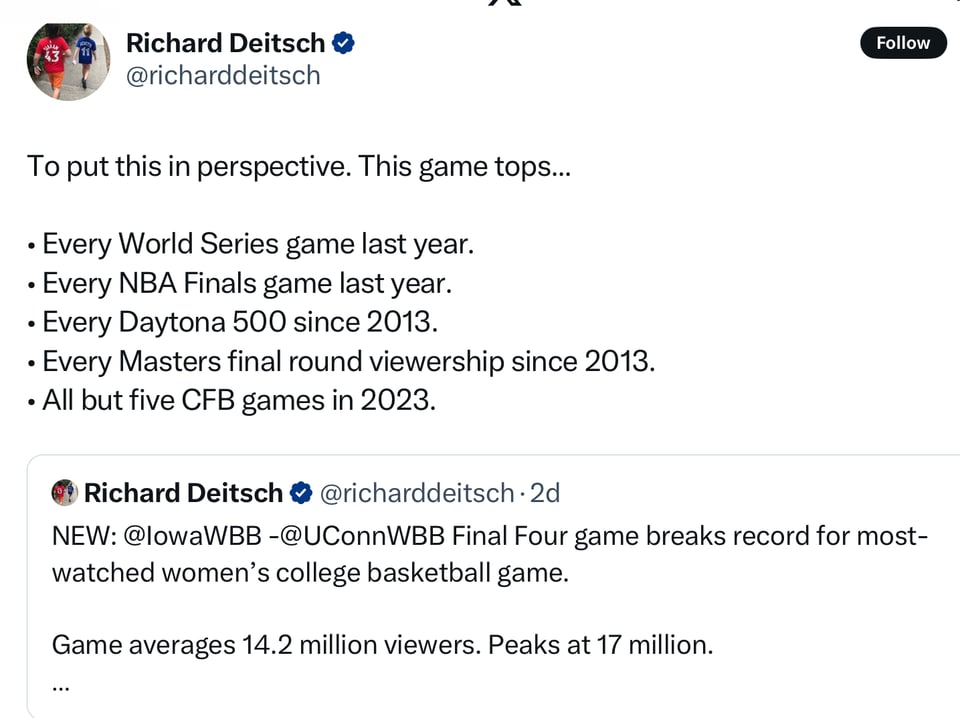
South Carolina -Iowa Championship Game breaks record for most-watched women’s college basketball game.
The NCAA Women’s Championship between Iowa and South Carolina set a record on Sunday, drawing 18.7 million viewers on ABC and ESPN.
The game peaked at 24 million viewers, ESPN said, and was the most-watched NCAA women’s college basketball game since 1992. Viewership jumped 89% from last year’s women’s championship and 285% from 2022, according to ESPN.
___________________________________________
An Overview - Yesterday millions saw the 2024 Eclipse, as the universe “turned day into night.”
I hope you were one of those millions, having a wonderful time, watching one of the wonders of the universe with the entire world.
A mystical experience’: millions watch total solar eclipse sweep across North America.
The ethereal spectacle of a total solar eclipse swept across North America on Monday afternoon, giving tens millions of people in Mexico, the US and Canada the chance to witness a rare and dazzling celestial show.
Almost 32 million people were in the path of totality as the moon’s shadow crossed the Mexico-Texas border at lunchtime and traversed 15 states over the next hour and a half, although many, especially in the south and midwest, were denied a clear view by low clouds and rain.
Those who did get to experience it were treated to a remarkable and surprisingly emotional display that won’t be seen again in the US until 2044. Cities were plunged into sudden darkness, chilled by a precipitous drop in temperature, and felt the stillness of twilight in the middle of the day.

“There’s something very mysterious about a total solar eclipse, when literally day turns to night, animals start to behave differently, and we see changes in the Earth’s atmosphere,” Pam Melroy, the deputy head of Nasa, and a retired astronaut who has degrees in astronomy and planetary sciences, told CNN.
“It’s a mystical, mysterious experience. And I love the thought that millions of Americans stood together today, looking up into the sky.”
Tourism officials believe at least 4 to 5 million traveled from other parts of the US to witness the show, making it the country’s biggest travel day of the year and bringing in an estimated $1.5bn economic boost.
Many were up before dawn to stake their place, and cities from Texas to Maine, as well as others outside the path of totality, hosted watch parties and gave away free eclipse glasses.
Joe Biden posted a message from the White House, calling the eclipse an event “worth marveling at”, and urging Americans to use safety glasses to look at the sun.
The Dallas-Fort Worth region was the largest metropolitan area on the path of totality, making north Texas a major destination and creating potential headaches for locals. The cloudy weather left some scrambling at the last minute to change plans and head for clearer skies, but for much of north Texas totality itself was clear.
The agency also conducted science experiments. It fired rockets into the moon’s shadow to study how Earth’s upper atmosphere is affected by the momentary dimming of sunlight and the possible impact on communications systems, and it harnessed an army of citizen volunteers to capture images of the solar corona during totality, then help analyze them afterwards.

Meanwhile, at several zoos, researchers joined public volunteers to watch the behavior of animals. During previous eclipses, giraffes ran around frantically, tortoises started rutting and gibbons sang and barked, although television images of zebras at Dallas zoo on Monday showed them largely unimpressed by the event.
The most recent total solar eclipse in the US was in 2017, but an interval of only seven years is unusual. This one had a longer track, and a wider shadow of totality than seven years ago because the moon was closer to Earth.
The time of totality in any given location was also longer. In 2017, the longest duration anywhere was two minutes and 42 seconds. Today it was four minutes and 28 seconds in Torreón, Mexico, while almost every place along the path experienced between three and a half to four minutes of totality, even if those below could not always see the eclipse.
The next total solar eclipse anywhere in the world is 12 August 2026, covering large areas of the northern hemisphere, with totality limited to Greenland, Iceland, Spain, Russia and a small area of Portugal. The UK will see a partial eclipse of more than 90%.
Residents of the mainland US must wait until 22 August 2044, when a total eclipse will be seen in North and South Dakota and Montana, plus northern Canada.
Following that, it is almost exactly one year until the next coast-to-coast total eclipse in the US, on 12 August 2045, spanning California to Florida. (The Guardian).
This was 3:18 pm, near the solar eclipse's 90% maximum for Manhattan, before clouds obscured the view. A thrill to observe as sunlight dimmed and people looked to the sky with eclipse glasses. #Eclipse2024 pic.twitter.com/LnoOqwDsWu
— Manhattan Bird Alert (@BirdCentralPark) April 8, 2024

Photo. Peter Finder.

___________________________________________